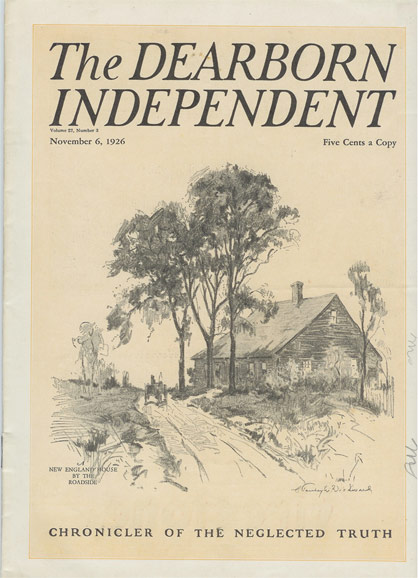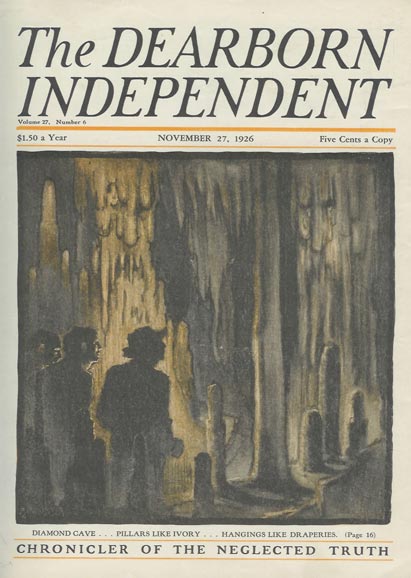Post by Jon Do on Jan 2, 2015 21:54:53 GMT -5
Henry Ford (July 30, 1863 – April 7, 1947) was an American industrialist, peace activist, and critic of Jewish supremacy. He was the founder of the Ford Motor Company and father of modern assembly lines used in mass production. His introduction of the Model T automobile revolutionized transportation and American industry. He was a prolific inventor and was awarded 161 U.S. patents. As sole owner of the Ford Company he became one of the richest and best-known people in the world and back home was referred to as America's Number One citizen.

He is credited with "Fordism", that is, the mass production of large numbers of inexpensive automobiles using the assembly line which could finish a car in 98 minutes, coupled with high wages for his workers—notably the $5.00 per day pay scale adopted in 1914. Ford had a global vision, with consumerism as the key to peace. Ford did not believe in accountants; he amassed one of the world's largest fortunes without ever having his company audited. The company's first audit occurred after Henry Ford II became head of the company. Henry Ford's intense commitment to lowering costs resulted in many technical and business innovations, including a franchise system that put a dealership in every city in North America, and in major cities on six continents. Ford left most of his vast wealth to the Ford Foundation but arranged for his family to control the company permanently.
Ford was born on July 30th, 1863, on a farm next to a rural town west of Detroit, Michigan (this area is now part of Dearborn, Michigan). His father, William Ford (1826-1905), was born in County Cork, Ireland. His mother, Mary Litogot Ford (1839-1876), was born in Michigan; she was the youngest child of Belgian immigrants; her parents died when Mary was a child and she was adopted by neighbours, the O'Herns. Henry Ford's siblings include: Margaret Ford (1867-1868); Jane Ford (c. 1868-1945); William Ford (1871-1917) and Robert Ford (1873-1934).
FORD MOTORS
At age 40, Ford, with 11 other investors and $28,000 in capital, incorporated the Ford Motor Company in 1903. In a newly-designed car, Ford gave an exhibition on the ice of Lake St. Clair, driving one mile (1.6 km) in 39.4 seconds, setting a new land speed record at 91.3 miles per hour (147.0 km/h). Convinced by this success, the race driver Barney Oldfield, who named this new Ford model "999" in honor of a racing locomotive of the day, took the car around the country, making the Ford brand known throughout the United States. Ford was also one of the early backers of the Indianapolis 500.
Ford astonished the world in 1914 by offering a $5 per day wage which more than doubled the rate of most of his workers. The move proved extremely profitable; instead of constant turnover of employees, the best mechanics in Detroit flocked to Ford, bringing in their human capital and expertise, raising productivity, and lowering training costs. Ford called it "wage motive." The company's use of vertical integration also proved successful when Ford built a gigantic factory that shipped in raw materials and shipped out finished automobiles.
THE DEARBORN INDEPENDANT
In 1918, Ford's closest aide and private secretary, Ernest G. Liebold, purchased an obscure weekly newspaper, The Dearborn Independent for Ford. The Independent ran for eight years, from 1920 until 1927. The newspaper published the controversial "Protocols of the Learned Elders of Zion. The American Jewish Historical Society describes the ideas presented in the magazine as "anti-immigrant, anti-labor, anti-liquor, and anti-Semitic." In February 1921, the New York World published an interview with Ford, in which he said "The only statement I care to make about the Protocols is that they fit in with what is going on."

Along with the Protocols, anti-Jewish articles published by The Dearborn Independent were also released in the early 1920s as a set of four bound volumes, cumulatively titled The International Jew, the World's Foremost Problem. Vincent Curcio writes of these publications that "they were widely distributed and had great influence, particularly in National Socialist Germany, where no less a personage than Adolf Hitler read and admired them." Hitler, fascinated with automobiles, hung Ford's picture on the wall; Ford is the only American mentioned in Hitler's book. Steven Watts writes that Hitler "revered" Ford, proclaiming that "I shall do my best to put his theories into practice in Germany, and modeling the Volkswagen, the people's car, on the model T.
Michael Barkun observed, "That Cameron would have continued to publish such controversial material without Ford's explicit instructions seemed unthinkable to those who knew both men. Mrs. Stanley Ruddiman, a Ford family intimate, remarked that 'I don't think Mr. Cameron ever wrote anything for publication without Mr. Ford's approval.'"According to Spencer Blakeslee;
The Dearborn Independent, also know as The Ford International Weekly, was a weekly newspaper established in 1901, but published by Henry Ford from 1919 through 1927. The first issue under Ford’s direction appeared on January 11, 1919. The subtitle of the publication was Chronicler of the Neglected Truth. It created a sensation when it published the Protocols of the Elders of Zion and later ran the headline, “The International Jew: The World’s Problem” on May 22, 1920.

He is credited with "Fordism", that is, the mass production of large numbers of inexpensive automobiles using the assembly line which could finish a car in 98 minutes, coupled with high wages for his workers—notably the $5.00 per day pay scale adopted in 1914. Ford had a global vision, with consumerism as the key to peace. Ford did not believe in accountants; he amassed one of the world's largest fortunes without ever having his company audited. The company's first audit occurred after Henry Ford II became head of the company. Henry Ford's intense commitment to lowering costs resulted in many technical and business innovations, including a franchise system that put a dealership in every city in North America, and in major cities on six continents. Ford left most of his vast wealth to the Ford Foundation but arranged for his family to control the company permanently.
Ford was born on July 30th, 1863, on a farm next to a rural town west of Detroit, Michigan (this area is now part of Dearborn, Michigan). His father, William Ford (1826-1905), was born in County Cork, Ireland. His mother, Mary Litogot Ford (1839-1876), was born in Michigan; she was the youngest child of Belgian immigrants; her parents died when Mary was a child and she was adopted by neighbours, the O'Herns. Henry Ford's siblings include: Margaret Ford (1867-1868); Jane Ford (c. 1868-1945); William Ford (1871-1917) and Robert Ford (1873-1934).
FORD MOTORS
At age 40, Ford, with 11 other investors and $28,000 in capital, incorporated the Ford Motor Company in 1903. In a newly-designed car, Ford gave an exhibition on the ice of Lake St. Clair, driving one mile (1.6 km) in 39.4 seconds, setting a new land speed record at 91.3 miles per hour (147.0 km/h). Convinced by this success, the race driver Barney Oldfield, who named this new Ford model "999" in honor of a racing locomotive of the day, took the car around the country, making the Ford brand known throughout the United States. Ford was also one of the early backers of the Indianapolis 500.
Ford astonished the world in 1914 by offering a $5 per day wage which more than doubled the rate of most of his workers. The move proved extremely profitable; instead of constant turnover of employees, the best mechanics in Detroit flocked to Ford, bringing in their human capital and expertise, raising productivity, and lowering training costs. Ford called it "wage motive." The company's use of vertical integration also proved successful when Ford built a gigantic factory that shipped in raw materials and shipped out finished automobiles.
THE DEARBORN INDEPENDANT
In 1918, Ford's closest aide and private secretary, Ernest G. Liebold, purchased an obscure weekly newspaper, The Dearborn Independent for Ford. The Independent ran for eight years, from 1920 until 1927. The newspaper published the controversial "Protocols of the Learned Elders of Zion. The American Jewish Historical Society describes the ideas presented in the magazine as "anti-immigrant, anti-labor, anti-liquor, and anti-Semitic." In February 1921, the New York World published an interview with Ford, in which he said "The only statement I care to make about the Protocols is that they fit in with what is going on."

Along with the Protocols, anti-Jewish articles published by The Dearborn Independent were also released in the early 1920s as a set of four bound volumes, cumulatively titled The International Jew, the World's Foremost Problem. Vincent Curcio writes of these publications that "they were widely distributed and had great influence, particularly in National Socialist Germany, where no less a personage than Adolf Hitler read and admired them." Hitler, fascinated with automobiles, hung Ford's picture on the wall; Ford is the only American mentioned in Hitler's book. Steven Watts writes that Hitler "revered" Ford, proclaiming that "I shall do my best to put his theories into practice in Germany, and modeling the Volkswagen, the people's car, on the model T.
Michael Barkun observed, "That Cameron would have continued to publish such controversial material without Ford's explicit instructions seemed unthinkable to those who knew both men. Mrs. Stanley Ruddiman, a Ford family intimate, remarked that 'I don't think Mr. Cameron ever wrote anything for publication without Mr. Ford's approval.'"According to Spencer Blakeslee;
"The ADL mobilized prominent Jews and non-Jews to publicly oppose Ford's message. They formed a coalition of Jewish groups for the same purpose and raised constant objections in the Detroit press. Before leaving his presidency early in 1921, Woodrow Wilson joined other leading Americans in a statement that rebuked Ford and others for their antisemitic campaign. A boycott against Ford products by Jews and liberal Christians also had an impact, and Ford shut down the paper in 1927, recanting his views in a public letter to Sigmund Livingston, ADL".
The Dearborn Independent, also know as The Ford International Weekly, was a weekly newspaper established in 1901, but published by Henry Ford from 1919 through 1927. The first issue under Ford’s direction appeared on January 11, 1919. The subtitle of the publication was Chronicler of the Neglected Truth. It created a sensation when it published the Protocols of the Elders of Zion and later ran the headline, “The International Jew: The World’s Problem” on May 22, 1920.
***
The essence of the Jewish Idea to its influence on the labor world is the same as in all other departments-the destruction of real values in favor of fictitious values. The Jewish philosophy of money is not to "make money," but to "get money." The distinction between these two is fundamental. That explains Jews being "financiers" instead of "captains of industry." It is the difference between "getting" and "making." The creative, constructive type of mind has an affection for the thing it is doing. The non-Jewish worker formerly chose the work he liked best. He did not change employment easily, because there was a bond between him and the kind of work he had chosen. Nothing else was so attractive to him. He would rather draw a little less money and do what he liked to do, than a little more and do what irked him. The "maker" is always thus influenced by his liking. Not so the "getter." It doesn't matter what he does, so long as the income is satisfactory. He has no illusions, sentiments or affections on the side of work. It is the "geld" that counts. He has no attachment for the things he makes, for he doesn't make any; he deals in the things which other men make and regards them solely on the side of their money-making value. "The joy of creative labor" is nothing to him, not even an intelligible saying. ”
—The International Jew: The World’s Foremost Problem, 1920.



